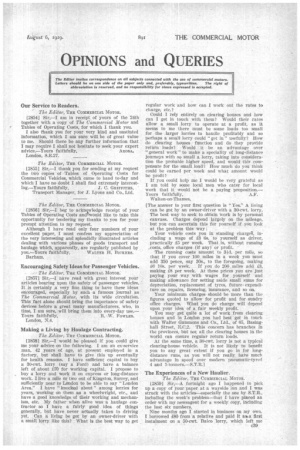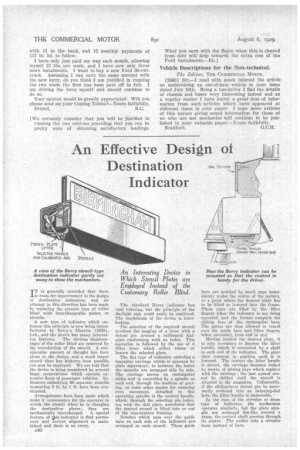OPINIONS and QUERIES Our Service to Readers.
Page 61

Page 62

If you've noticed an error in this article please click here to report it so we can fix it.
The Editor, THE COMMERCIAL MOTOR.
[2854] Sir,—I am in receipt of yours of the 24th together with a copy of The Commercial Motor and
• Tables of Operating Costs, for which I thank you. I also thank you for your very kind and unstinted information, which I am sure will be of great value to me. Should there be any further information that I may require I shall not hesitate to seek your expert advice.—Yours faithfully, AROSA• London, S.E.27.
The Editor, THE COMMERCIAL MOTOR.
[2855] Sir,—I thank you for sending at my request the two copies of Tables of Operating Costs for Commercial Vehicles, which came to hand to-day and which I have no doubt I shall find extremely interest ing.—Yours faithfully, J. C. GRIFFITHS, Transport Manager, for ,T. Lyons an Co., Ltd.
-The Editor, THE COMMERCIAL MOTOR.
• [2856] Sir,—I beg to acknqwledge receipt of your Tables of Operating Costs aritiould like to take this opportunity for tendering ray thanks to you for your prompt attention to my request.
Although I have read only four numbers of your excellent paper, I must confess my appreciation of the very interesting and splendidly illustrated articles dealing with various phases of goods transport and haulage which, apparently, are regularly published by you.—Yours faithfully, WALTER H. Illcauas. Barham.
Encouraging Safety Ideas for Passenger Vehicles, The Editor, THE COMMERCIAL MOTOR.
[2857] Sir,—I ha.ve read with great interest your articles bearing upon the safety of passenger vehicles. It is certainly a very fine thing to have these ideas encouraged, especially by such a famous journal as The Commercial Motor, with its wide circulation. This fact alone should bring the importance of safety devices before a great many manufacturers, who, in time, I am sure, will bring them into every-clay use.— Yours faith-fully, It. W. FOWLES. London, N.4.
Making a Living by Haulage Contracting.
The Editor, THE COMMERCIAL MOTOR.
[2858] Sir,—I would be pleased if you could give me your advice on the following. I am an ex-service man, 42 years of age, at present employed in a factory, but shall have to give this up eventually for health reasons. I have sufficient capital to buy a 30-cwt. lorry (say a Ford) and have a balance left of about £70 for working capital. I propose to buy a lorry and work it on express or long-distance work. I live a mile or two out of Kingston, Surrey, and sufficiently near to London to be able to say "London Area." I have "knocked about" among lorries for years, working on them as a wheelwright, etc., and have a good knowledge of their working and mechanism, etc. My father when alive was -ahaulage contractor so L have a fairly goodidea of things generally, but have never actually taken to driving yet. Can a living be got by an owner-driver with a small lorry, like this? What is the best way to get
regular work and how can I work out the rates to charge, etc.?
Could I rely entirely on clearing houses and how can I get in touch with them? Would their rates allow a small lorry to operate at a profit, as it seems to me there must be some loads too small for the larger lorries to handle profitably and so perhaps a small lorry could "get in" usefully? How do clearing houses, function and do they provide return loads? Would it be an advantage over "general work" to make a speciality of long-distance journeys with so small a lorry, taking into consideration the probable higher speed, and would this compensate for the small. load? ITow much do you think could be earned per week and what amount would be profit? • If you could help me I would be .very grateful as I am told by some local men who cater for local work that it would not be a paying proposition.— Yours faithfully, A.F. Walton-on-Thatnes.
[The answer to your first question is "Yes." A living can be got by an owner-driver with a 30-ewt. lorry. The best way to seek to obtain 'Work is by personal canvass. Charges depend largely on the mileage, but you can ascertain this for yourself if you look at the problem this way
Your vehicle costs you in standing charge -, including a wage of £3 6s. to-yourself as driver, practically £.5 per week. That is, without running ...costs, office charges (if any) or profit. '
The running costs amount to aid. per mile, so that if you cover 100 miles in a week you most add 350 pence, say 30s., to the foregoing, making £6 10s. per week. . If you do 200. miles add £3, making £8 per week. At these prices you are just paying your way with wages for yourself and making allowance for setting aside small sums for depreciation, replacement of tyres, future, expenditure on repairs, licencing, insurance, and so on.
Your minimum charges should be more than the figures quoted to allow for profit and for sundry office charges. What you do charge will depend upon your idea of a fair weekly profit.
You may get quite a lot of work from clearing houses and in London you had best get in touch with Waiter Gammons and Co., Ltd., of 65, Basinghall Street, E.C,2. • This concern has branches in the provinces, but not all the clearing houses in the world can ensure regular return loads. At the same time, a 30-cwt. lorry is not a typical clearing-house vehicle. It is not likely to benefit you to any great extent if you go in for longdistance runs, as you will not really have much adtantage in speed over modern pneumatic-tyred 4 and 5-tonners.—S.T.R.]
The Experiences of a New Haulier.
The Editor, THE COMMERCIAL MOTOR.
[2859] Sir,—A fortnight ago I happened to pick up a copy of Your paper at a wayside inn and I was struck with the article., especially the one by S.T.11, including the week's problem—that I have placed an order with my newsagent for a weekly copy, including the last six numbers.
Nine months ago I started in business on my own. I borrowed £80 from -a relative and paid it a&.a first instalment on a 50-cwt. Rale° lOrry, which left me'
with 11 in the hank, and 12 monthly payments of £17 Ss. ld. to follow.
I have only just paid my Way each month, allowing myself V 15s. per week, and I have now only three more instalments. I want to buy a new Ford 30-cwt. truck. Assuming I can earn the same amount with the new lorry, do you think I am justified in running the two when the first has been paid off in full. I am driving the lorry myself and should continue to do so.
Your opinion would be greatly appreciated. Will you please send me your Costing Tables —Yours faithfully, Bristol, R.C.
[We certainly consider that you will be justified in running the two vehicles providing that you can be pretty sure of obtaining satisfactory loadings. What you earn with the Baico when this is cleared from debt will help towards the extra cost of the Ford instalments.—En.}
Vehicle Descriptions for the Non-technical.
The Editor, TEE COMMERCIAL MOTOR.
[2800] Sir,—I read with much interest the article on modernizing an out-of-date vehicle in your issue dated July 10th. Being a bus-driver I find the details of chassis and buses very interesting indeed and as a regular reader I have learnt a great deal of information from such articles which have appeared at different times in your paper, I hope more articles of this nature giving sound information for those of its who are not mechanics will continue to he published in your valuable paper.—Yours faithfully,
Bradford. G.C.H.














































































































